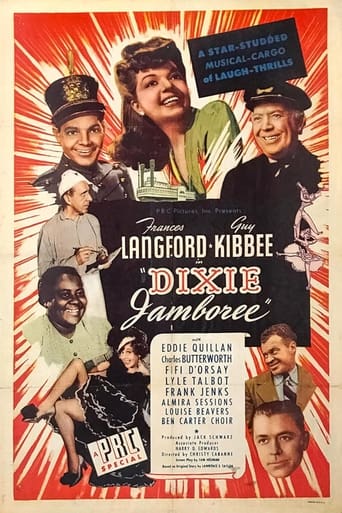JohnHowardReid
For fans of Frances Langford (like me), this little movie is a real treat. Admittedly, you've also got to put up with Eddie Quillan's way overdone performance as a hexed trumpet player, plus Frank Jenks's hammy, over-expressive rendition as chief offsider for the super-smooth lead gangster, a bad egg played by Lyle Talbot. Talbot is good, but the rest of the cast, featuring Guy Kibbee, Charles Butterworth and Fifi d'Orsay – plus Frances L. of course – is great. Even Christy Cabanne's direction is smart enough and winning enough to cover most of the holes in the paper-thin script. Six songs by Michael Breen and Sam Neumann are on the track, four of them enjoyably rendered by Langford, and one by Fifi d'Orsay. Grapevine's very good quality DVD also includes "The Brementown Musicians" (1935), an excellent cartoon from Ub Iwerks which is presented in its original Cinecolor, which I'm happy to say has not faded and still looks great.
MartinHafer
"Dixie Jamboree" is a film from PRC--a tiny production company that had a long track record of sub-par films...at best. Tiny PRC made a ton of films that are rarely worth your time but fools like me watch them because we are crazy film buffs, I guess! The film is very much like "Showboat"....except "Showboat" was a good play and film. As for "Dixie Jamboree", it features lots of singing--but none of the singing (except for the black singers at the beginning) were any good and none of the songs were any good either. As for the acting, you know a film is in trouble when it relies on Frances Langford and Eddie Quillen! The only potential bright spots were Charles Butterworth and Guy Kibbee--who always provide some goofy support. But even here, they're not even close to being at their best because the material is just very limp. The bottom line is that the film is not terrible---just uniformly poor and dull. Forgettable in every way.PS--You politically correct folks take note--this film WILL offend thanks to its patronizing treatment of the black actors throughout the movie. Typical of the times but still kind of sad.
Larry SLuss
I pulled this movie from the Indianapolis Library soon after the death of Frances Langford. I wanted to remember her and this was the only thing Indianapolis had easily available. Her singing is OK with incidental songs, but that does not justify the time to watch it. Another commentator said it was an hour and a half. My copy is sixty minutes or so. Maybe that's for the better. The whole thing is a bit too stereotyped. The concept of the crooks is a bit much. Kibbee and Butterworth do the thing they do rather well. If you are a fan of those two, then it might be worth while seeing them in one of there last works.
richard.fuller1
If you like to watch old movies devoid of acclaimed actors, directors and studios and judge for yourself if it is a good movie, avoid this one. I watched it solely to see old depictions of Mississippi riverboat people, both blacks and whites, but these were hardly the most offensive. Louise Beevers as Opal, the maid (of course), had minimal decent dialogue as a woman and a person, and Gloria Jetters as Azella, a small black child, delivered more than would have been expected from a child back then who wasn't Shirley Temple or Natalie Wood. There is even an enjoyable spiritual sung by the fiery black reverend (even tho the character is named in the film, the actor goes uncredited) on the docks with other black singers. Delightful to see as black portrayals can get extremely rare in most films and historically compelling as well. More offensive were the mobsters (tired cliches from Lyle Talbot) and the French songstress, Yvette, played by Fifi Dorsay, who comes across like she is every man's desire. But the clinchers are the two uncredited Native American indians, no doubt really Anglo performers of some kind, who say virtually nothing and this was probably to their advantage, being deprived of any 'ugh' and 'how' phrases. The characters are named Double and Nothing (introduced as "Double or Nothing") and play the drums to the fledgling trumpeter played by Eddie Quillan. In one scene they are being released from jail and one of the Natives hands the officer a message that reads 'Merci Bien'. The officer quips that it must be in Indian as he apparently cannot read it. Ba-dum-bump! Frances Langford was the only performer I was really familiar with, so I expected this to be a vehicle for her. In fact it seems to be a launching pad for Quillan, totally uninteresting as trumpet player Jeff Calhoun. He is supposed to get 'the tickle', the inspiration to play mesmerizing, captivating music at such times. Quillan is almost frightening at these moments as he raises his eyebrows, bulges his eyes and tosses his big dark eyes back and forth. Not an inviting portrayal and Harry James had nothing to worry about.Thankfully it is only an hour and a half long. Still not worth the time. The 'plot' involved the gangsters thinking the miracle elixir sold on the riverboat was a whiskey running operation and Langford acting jealous of Dorsay and Quillan constantly apologizing for playing at inopportune times on his trumpet. Comedy relief characters like the Professor played by Charles Butterworth and the ditzy Captain's wife played by Elmira Sessions get on my nerves more than racial or ethnic characters.


